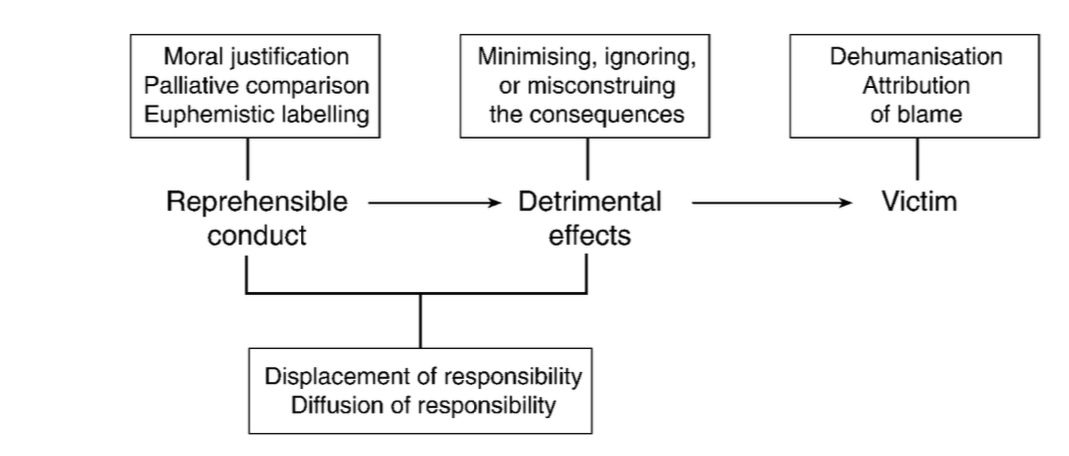Click here and press the right key for the next slide.
(This may not work on mobile or ipad. You can try using chrome or firefox, but even that may fail. Sorry.)
also ...
Press the left key to go backwards (or swipe right)
Press n to toggle whether notes are shown (or add '?notes' to the url before the #)
Press m or double tap to slide thumbnails (menu)
Press ? at any time to show the keyboard shortcuts
Moral Disengagement: The Theory

Moral Disengagement: The Theory
[email protected]
self-regulation
adopt standards
judge own actions
apply sanctions
Moral conduct is motivated and regulated through the ongoing exercise of evaluative self-influence,
which can sometimes prevent you getting things you want.
(Bandura, 2002, p. 102).
Imagine you are tempted to do something that is, by your own standards, wrong.
It’s obvious—or should be—that doing this will put others’ lives at risk.
You anticipate feeling bad (self-inflicted sanctions) if you surrender to temptation.
But you decide to give in to the temptation and do it.
What do you tell yourself?
Examples of moral disengagement
Everyone else is doing it
Last time even the PM didn’t stick to the rules so why should I
The rules are stupid
It’s only a mild illness for most people
I’m unlikely to infect anyone
People who get it were likely to die anyway.

Note the role of reason.
Bandura (2002, p. figure 1)
aside: moral disengagement and moral intutions
Intuitions are claims you accept take to be true independently of whether they are justified inferentially.
Acquiring a moral intuition can be triggered by a situation.
Reasoning from known principles cannot directly influence moral intuitions.
Reasoning from known principles can
modify how events are interpreted,
which aspects are attended to,
and how things and actions are categorised (e.g. dehumanization),
and so indirectly influence moral intuitions.

Note the role of reason.
Bandura (2002, p. figure 1)
Why is the role of reason significant?
minor
driven by feelings -> unreliable
driven by reasoning -> reliable
Moral judgements are not always entirely consequences of feelings.
Some moral judgements are, at least in part, consequences of reasoning from known principles.
moral dumbfounding
sometimes, not always:
intuition
-> judgement
-> reasoning
moral disengagement
sometimes:
(intuition
->) reasoning
-> judgement
But why accept the theory?